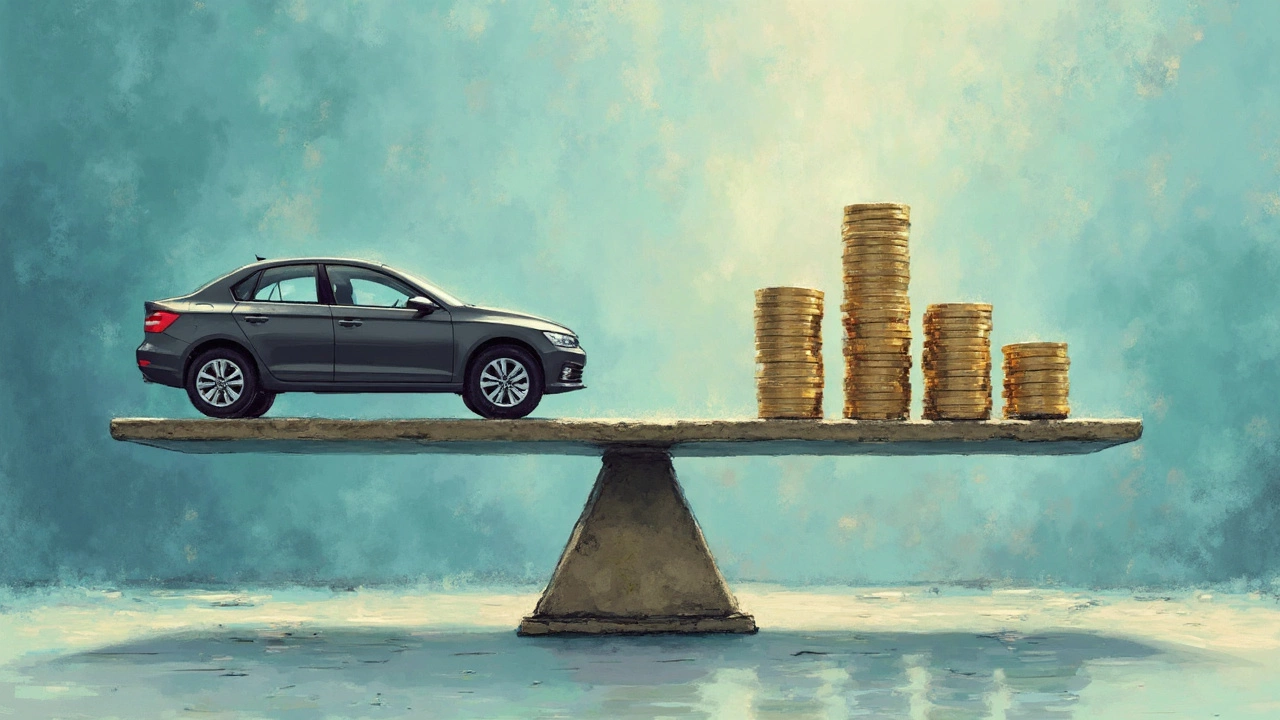Ever thought about putting money down when financing a car? It’s one of those things you’ve heard a lot about but never really explored in depth. Well, let's jump into the world of down payments and see if it makes sense for you.
First up, a down payment is simply an upfront lump sum you pay when you buy a car on finance. It can be tempting to skip this step to have more cash in hand, but you might want to reconsider. Why? Because putting money down could lower your monthly payments and even save you money on interest over the loan's life. Sounds pretty good, right?
But wait, there's more to consider. Maybe parting with that cash now isn’t the best move for your wallet. You’ve got to think about your needs, your budget, and whether it's worth the trade-off. So stick around, and we'll go through the whole shebang together.
- Understanding Down Payments
- Benefits of Putting Money Down
- Potential Downsides
- How Much Should You Put Down?
- Alternatives to Down Payments
- Making a Smart Decision
Understanding Down Payments
So, what exactly is a down payment when you’re talking about car finance? It’s like the very first, upfront handshake in the car buying process. You hand over a chunk of money, and in return, it reduces the total amount you need to borrow. No one likes hefty loans, do they?
A down payment has benefits beyond just making you feel good about chipping off a bit of that huge sticker price. Firstly, by reducing your loan amount, you're going to have smaller monthly payments. Think about it—a smaller loan means you pay less every month. It’s a simple math trick!
Now, you might be asking, ‘How much should I pay as a down payment?’. Typically, 20% of the car's price is a good aim. It might sound like a lot, but it can save you in several ways. Lower loan amounts mean less debt, and less interest over time. Talk about a win-win!
Crunching the Numbers
Let’s break it down further with some numbers. Say you’re eyeing a car worth €20,000. A 20% down payment would be €4,000. If you skip this step and finance the full amount, you could end up paying significantly more in interest over the years. Who knew saving could be this straightforward?
When Might You Skip the Down Payment?
Of course, not everyone can shell out thousands upfront. If your wallet’s feeling a bit thin, don’t stress. Some lenders do offer zero down payment options, but you’ll have to evaluate if higher monthly payments and interest rates are worth the swap. Staying informed helps make the best call for your own situation.
Benefits of Putting Money Down
So, why might putting money down on a financed car be a savvy move? Trust me, there are some solid reasons!
Lower Monthly Payments
First off, plunking down a nice chunk of cash can lower those pesky monthly payments. Let’s face it, nobody likes a big hole in the wallet every month. When you make a down payment, you're essentially reducing the amount you need to finance. Less borrowed dough means smaller payments each month. Simpler math than that fourth-grade arithmetic test, right?
Reduced Interest Costs
Interest is like that extra luggage fee—unexpected and frustrating. But guess what? A solid down payment can help you pay less interest over time. Since you'll be borrowing less money, the total interest charged on your loan shrinks. It's like a double savings combo!
Avoid Negative Equity
No one wants to owe more on the car than it's worth—a situation known as negative equity or being "upside down" on your loan. A decent down payment gives you a head start against depreciation. Cars can drop in value faster than that ice cream melting on a hot summer day.
Peace of Mind
There’s something about owning a bigger slice of your car upfront that gives peace of mind. It’s like having a cozy blanket on a chilly night—you're not just comfortable, you feel secure. You’re building equity right from the get-go!
Potential Discounts
Sometimes, dealerships offer better terms, like reduced interest rates, if you can cough up a strong down payment. Think of it as hitting a mini-jackpot—except, you know, it's your money doing the hard work!
| Scenario | Loan Amount | Interest Rate | Total Interest |
|---|---|---|---|
| No Down Payment | €20,000 | 5% | €5,000 |
| €3,000 Down Payment | €17,000 | 5% | €4,250 |
See how just a bit of cash upfront can save you a pretty penny in the long haul? We bet dinner for two sounds better than more interest payments.
Potential Downsides
Let’s get real—while putting money down on your car loan may seem like a solid choice, it's not all sunshine and rainbows. There are a few downsides you should consider before making any hasty decisions.
Draining Your Savings
First off, dropping a big down payment might leave your savings account looking a bit sad. Having some savings set aside for a rainy day is always a good thing. So, if that chunk of change could leave you strapped for cash in an emergency, it might not be worth it.
Opportunity Cost
By choosing to make a large upfront payment, you're also potentially missing out on other investment opportunities. Maybe that money could earn more if invested elsewhere rather than being tied up in a depreciating asset like a vehicle.
Immediate Loss of Money
Cars depreciate fast—like, seriously fast. According to some data, new cars can lose around 20% of their value in the first year alone. So, if you put down a big sum of money, you're essentially losing a chunk of that as soon as you drive the car off the lot.
Reduced Liquidity
Paying a large amount upfront reduces your liquidity, meaning you have less available cash for everyday expenses or unexpected costs. This reduced liquidity can sometimes stress your financial flexibility, especially if other unforeseen expenses crop up.
So sure, a down payment can cut monthly expenses, but weigh these potential downsides against the benefits. It’s all about finding the right balance for your specific situation. You’ve got to look at the big picture before pressing forward with your vehicle purchase decision.

How Much Should You Put Down?
Deciding how much money to put down on a car loan can feel like solving a puzzle. The general rule of thumb? Aim for at least 20% of the vehicle's price. But hey, rules are meant to be guidelines, not rigid demands. Your scenario might be different.
Why 20%? This figure often helps you avoid being "upside down" on your loan, which means owing more than the car's worth. Second, a sizable down payment shrinks your loan amount, meaning more of your budget goes toward paying off the principal rather than interest. Every bit saved on interest is more cash in your pocket.
Should You Adjust Based on Your Situation?
Of course, the 20% mark might not be realistic for everyone. Depending on your budget and priorities, you could put down less, especially if you’ve found a low-interest rate offer or if the car you’re eyeing is pre-owned.
Consider your car finance options. If you're trading in an older vehicle, its value counts toward your total down payment. Have equity from your previous car's trade-in? Great! You could possibly fork out a bit less out of pocket while still hitting that 20%.
Crunching Numbers: A Quick Look
For those who crave numbers, here’s a quick example:
| Car Price | Recommended Down Payment (20%) |
|---|---|
| €25,000 | €5,000 |
| €15,000 | €3,000 |
Remember, whether it's 20% or a different figure, the key is to make a choice that fits your financial picture.Put money down only if it helps, not hinders, your long-term goals.
Alternatives to Down Payments
Not keen on putting a chunk of cash down when buying a car? No worries! There are other ways to handle this situation without breaking the bank. Let's check out some options that might give you a little breathing room.
0% Interest Financing
Many car dealerships offer 0% interest financing for well-qualified buyers. It sounds too good to be true, right? It basically means you won't pay extra interest on your car loan, which could free up the cash you were thinking of using for a down payment. Just keep in mind, these deals often require excellent credit scores, so it's not available to everyone. Still, it's a sweet deal if you can snag it.
Consider Trade-Ins
Got an old car sitting idle? Consider trading it in. The value of your trade-in could be used like a down payment but without needing extra cash. This can reduce the loan amount, ultimately saving you money. Trading in is straightforward and hassle-free, especially when you negotiate at the dealership.
Opt for Leasing
If owning isn't crucial, leasing is a great alternative. Leasing usually requires less upfront, and your monthly costs could be lower than a purchase loan. You're essentially renting, so the car reverts back at the lease end. It's ideal if you like switching cars every few years.
Explore Manufacturer Rebates
Car manufacturers sometimes offer rebates to attract buyers. These aren't exactly like a down payment, but they can reduce the purchase price or loan amount. Check if the car model you’re eyeing comes with any such perks—it could be a pleasant surprise!
Sorting through car finance options can be a bit of a maze, but rest assured, you don't always need to part with a stack of cash upfront. Weighing these alternatives carefully could save or redirect your funds to where they might do you the most good!
Making a Smart Decision
Alright, so you’re at the crossroads trying to decide how much you should put down on that financed car. To make the best choice for yourself, you really need to weigh your options carefully.
The Numbers Game
To start with, the rule of thumb is to aim for a 20% down payment. It's a common figure in the car finance world because it helps you avoid paying for private mortgage insurance and reduces the overall loan balance.
Here's a simple example: Let’s say the car you want is priced at $30,000. A 20% down payment means putting $6,000 upfront. It’s a bit of a sting upfront, but this typically lowers your monthly installments and cuts down the total interest paid over time.
Assessing Your Situation
Not everyone has $6,000 lying around. So if you find yourself struggling to scrape that amount together, it doesn't mean the end. Consider your current cash flow, emergency fund, and whether that cash could be better used elsewhere.
Moreover, if you have a high credit score, you might get away with a smaller down payment because you’ll probably snag a better interest rate.
Take a Holistic Approach
It's not just about numbers. Think about your future goals and financial commitments. Are you planning a big purchase soon? Are there personal situations that could need emergency funds? These questions can guide your decision.
Find a balance between putting enough down to make your loan affordable while keeping enough cash in your savings for a rainy day. It’s all about making sure you don’t put your finances on a tight leash.
Crunching the Numbers Yourself
Use an online loan calculator to figure out the differences between various down payment amounts – how they affect your monthly payment and total loan cost. It's like playing with a magic crystal ball that forecasts your probable financial future!
Piece all these puzzle parts—down payment size, monthly installments, total interest, potential loan tenure, present cash availability—to find the perfect balance for your unique situation. After all, you want your new set of wheels to drive joy, not financial stress!
